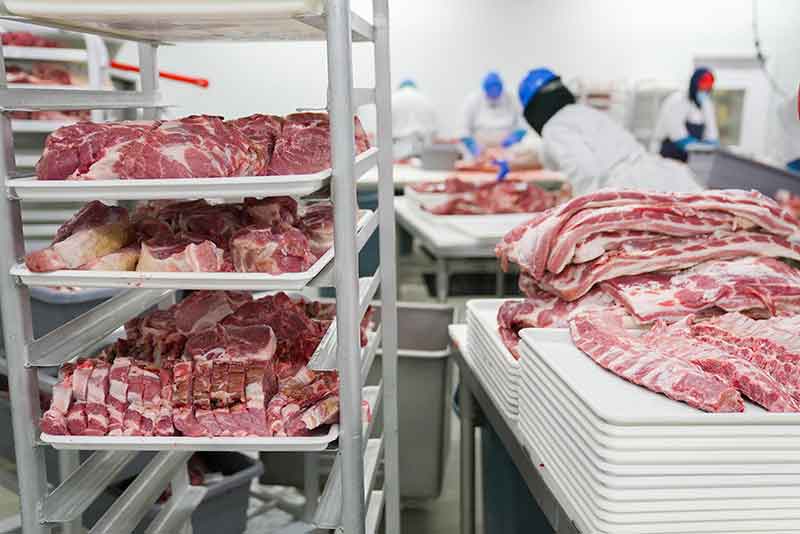Process control & machine operators
What does a process control and machine operator DO?
Process control and machine operators work with different kinds of machinery to process and package food and beverage products. Their jobs may require them to operate several machines designed to grind, extract, blend, cook, or package food products and beverages.
Operators set up, maintain and disassemble equipment based on the requirements of the product being produced. The machines that they run can involve mixing, packaging, cleaning or cooking.

Machine operators make sure that machines work at full capacity, are stocked with the necessary materials and are well-maintained. Operators perform necessary pre-operational activities such as checking if any parts of the machine are broken, the equipment is operating safely, and everything is clean before they start. During production, they watch the products as they come off the line to make sure everything is being made correctly. Machine operators rarely work by themselves and work in small teams.
Any machine operator will tell you that one of the most challenging parts of the job is troubleshooting equipment. For example, a common problem in manufacturing is when the weight of the product is higher than it should be. To correct this problem, a machine operator changes the settings on the machine or checks that the weight sensors are working correctly.
Production operators evaluate the quality of a product as it goes through the production line by verifying product weight, colour, temperature and appearance according to product standards. They are the first line of defence, so it is important that they keep an eye out for potential defects.
What are useful SKILLS to become a process control and machine operator?
Some skills useful to being a machine operator include paying attention to details and being able to read and understand computer printouts and information gauges on the machines.
In general, a production operator must have a high school diploma or GED to qualify for the job. However, more specialized training may be necessary if the job demands working with high-tech equipment or machinery. All companies provide on-the-job training, so no formal education is required.
Process control and machine operators are found in almost every food and beverage processing business in Ontario. The greatest concentration of jobs available right now are in Peel Region.
Machine operator is a good entry-level role and will allow a worker to progress in the company.
Industrial Butcher
What does an Industrial Butcher DO?

Industrial Butchers work in a fast-paced and physically demanding setting. While working in various stages of processing (slaughtering, cleaning, and cutting), they also maintain a sanitary work environment.
More specifically, Butchers prepare meat for customers by boning, tying, grinding, cutting and trimming meat. They clean, cut, weigh, package and label products to meet customer satisfaction. Most importantly, Butchers maintain and clean their workstations in order to reduce the risk of food contamination and adhere to food safety guidelines.
What are useful SKILLS to become an Industrial Butcher?
The work of a butcher requires a lot of concentration and care, as many of the tools that they use can be sharp and dangerous in unskilled hands. Butchery is a trade that rewards patience and attention to detail.
Becoming a butcher is a great career if you are looking for a job that does not require a postsecondary degree. Generally, employers only require a high school diploma or equivalent. Many butcher shops hire with no past work experience and are willing to train their employees. Within recent years, there has also been an increase in the number of schools providing coursework related to butchery. These college programs teach students skills in meat processing, product packaging, food safety standards and customer service.
Butchery is a physically demanding job because they are required to stand for long periods of time and continuously repeat the same movements. They must also be able to bend and stoop to grasp cuts of meat – something that can be difficult in cold environments. In this profession, your job is your workout!
WHERE do industrial butchers work?
Industrial butchers are most often employed in meat and poultry processing and packing plants. They can also be found working in grocery stores.
General working conditions for butchers are usually cold in order to keep meat products fresh. Butchers keep up with the cold by wearing layers and taking breaks in warmer areas of the facility.
General labourer
What does a general labourer DO?
General labourers perform material handling, clean up, packaging, and other activities related to food and beverage processing.
Day-to-day activities for general labour may require someone to use their skills within quality control, ISO 9000, food safety and handling, merchandising, stock rotation, computers, assisting the public, and warehousing and shipping.

What are useful SKILLS to become a general labourer?
General labour positions are typically entry-level jobs that don’t have formal education requirements. Successful general labourers will have a broad, useful skill set, and always be willing to learn more on the job.
“General labour” may be a broad term but in reality, it requires someone who is competent, self-motivated and reliable.
WHERE do general labourers work?
General labourers make up about 21% of total employment in Ontario’s food and beverage processing industry. They can be found in almost every food and beverage processing business in Ontario, including fruit and vegetable processing plants, dairies, flour mills, bakeries, sugar refineries, meat plants, wineries and breweries.
General labourer is a good role for someone looking for an entry-level position that will allow them to work their way up in a company.
Sources :
Labour Marker Information for Ontario’s Food and Beverage Processing Industry: Final Report
(Díaz Pinsent Mercier Research Inc. for Food Processing Skills Canada)
Career Paths in Food and Beverage (by Veronica Hislop & FoodGrads.com)
